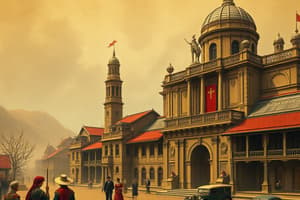Podcast
Questions and Answers
What is the primary focus of historiography?
What is the primary focus of historiography?
- Study of how history is written and interpreted (correct)
- Analysis of original artifacts and documents
- Comparison of different historical periods
- Collection of historical primary sources
Which of the following periods in history is characterized by the rise of feudalism?
Which of the following periods in history is characterized by the rise of feudalism?
- Modern History
- Ancient History
- Middle Ages (correct)
- Prehistory
How do primary sources differ from secondary sources in historical research?
How do primary sources differ from secondary sources in historical research?
- Secondary sources are less reliable than primary sources.
- Primary sources interpret past events, while secondary sources are original documents.
- Primary sources are original documents, while secondary sources analyze or interpret those documents. (correct)
- Secondary sources include artifacts, while primary sources include history books.
What is the significance of studying continuity and change in history?
What is the significance of studying continuity and change in history?
Which notable historian is recognized for emphasizing factual accuracy in historical accounts?
Which notable historian is recognized for emphasizing factual accuracy in historical accounts?
Flashcards are hidden until you start studying
Study Notes
Definition of History
- Study of past events, societies, and civilizations.
- Analysis of causes and effects of events.
Importance of History
- Understanding cultural heritage and societal development.
- Learning from past mistakes and successes.
- Contextualizing current events and issues.
Major Periods in History
-
Prehistory
- Time before written records.
- Includes the Stone Age, Bronze Age, Iron Age.
-
Ancient History
- Civilizations such as Mesopotamia, Egypt, Greece, Rome.
- Development of writing, agriculture, and empires.
-
Middle Ages
- Roughly 5th to late 15th century.
- Feudalism, the rise of Islam, the Crusades.
-
Modern History
- From the Renaissance to the present.
- Industrial Revolution, World War I and II, Cold War.
Historical Methods
- Primary Sources: Original documents, artifacts (e.g., letters, diaries).
- Secondary Sources: Analyses or interpretations of primary sources (e.g., history books).
- Historiography: Study of how history is written and interpreted.
Key Concepts in History
- Continuity and Change: Understanding what has remained the same and what has evolved.
- Cause and Effect: Analyzing the reasons behind events and their impacts.
- Perspective: Recognizing that history can be viewed differently based on cultural or social viewpoints.
Notable Historians
- Herodotus: Often called the "Father of History" for his work on the Greco-Persian Wars.
- Thucydides: Known for his account of the Peloponnesian War; emphasized factual accuracy.
- Marc Bloch: Emphasized social history and the study of historical methods.
Applications of History
- informs public policy, education, and cultural identity.
- helps develop critical thinking skills and understanding of complex societal issues.
Definition of History
- Examines past events, societies, and civilizations.
- Analyzes causes and effects of key events.
Importance of History
- Provides insight into cultural heritage and evolution of societies.
- Enables learning from past mistakes and successes.
- Contextualizes contemporary events and societal issues.
Major Periods in History
- Prehistory: Encompasses the time before written records; includes the Stone, Bronze, and Iron Ages.
- Ancient History: Features civilizations like Mesopotamia, Egypt, Greece, and Rome; marked by the development of writing and agriculture.
- Middle Ages: Spans from the 5th to late 15th century; characterized by feudalism, the rise of Islam, and the Crusades.
- Modern History: Begins with the Renaissance and continues to the present; includes significant events like the Industrial Revolution, World Wars, and the Cold War.
Historical Methods
- Primary Sources: Original documents and artifacts such as letters and diaries.
- Secondary Sources: Analyses and interpretations based on primary sources, often found in history books.
- Historiography: Focuses on the study of how history is recorded and perceived over time.
Key Concepts in History
- Continuity and Change: Analyzes what aspects remain constant versus those that evolve throughout time.
- Cause and Effect: Investigates the reasons behind events and their subsequent impacts.
- Perspective: Acknowledges that history can be interpreted differently based on cultural and social contexts.
Notable Historians
- Herodotus: Recognized as the "Father of History" for his detailed accounts of the Greco-Persian Wars.
- Thucydides: Noted for his emphasis on factual accuracy in his account of the Peloponnesian War.
- Marc Bloch: Advocate for social history and critical examination of historical methodologies.
Applications of History
- Influences public policy, education, and formation of cultural identities.
- Fosters critical thinking and understanding of multifaceted societal issues.
Studying That Suits You
Use AI to generate personalized quizzes and flashcards to suit your learning preferences.




